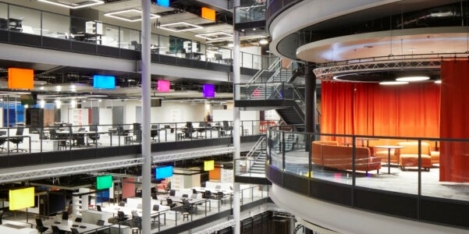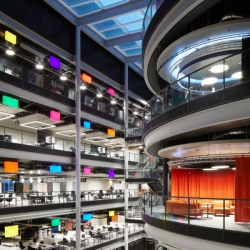To provide the best experiences, we use technologies like cookies to store and/or access device information. Consenting to these technologies will allow us to process data such as browsing behaviour or unique IDs on this site. Not consenting or withdrawing consent, may adversely affect certain features and functions.
The technical storage or access is strictly necessary for the legitimate purpose of enabling the use of a specific service explicitly requested by the subscriber or user, or for the sole purpose of carrying out the transmission of a communication over an electronic communications network.
The technical storage or access is necessary for the legitimate purpose of storing preferences that are not requested by the subscriber or user.
The technical storage or access that is used exclusively for statistical purposes.
The technical storage or access that is used exclusively for anonymous statistical purposes. Without a subpoena, voluntary compliance on the part of your Internet Service Provider, or additional records from a third party, information stored or retrieved for this purpose alone cannot usually be used to identify you.
The technical storage or access is required to create user profiles to send advertising, or to track the user on a website or across several websites for similar marketing purposes.
 A new study commissioned by Great Western Railway claims to reveal striking generational differences in attitudes towards remote working and its impact on mental health. The research, which explored the effects of remote working on different age groups, highlights a growing concern regarding the isolation experienced by older employees compared to their younger counterparts. (more…)
A new study commissioned by Great Western Railway claims to reveal striking generational differences in attitudes towards remote working and its impact on mental health. The research, which explored the effects of remote working on different age groups, highlights a growing concern regarding the isolation experienced by older employees compared to their younger counterparts. (more…)














 Any business that is looking to grow its consumer base or expand into new markets is likely to be relying on digital technology to a greater extent than ever before both in their operations and management. This also means that the
Any business that is looking to grow its consumer base or expand into new markets is likely to be relying on digital technology to a greater extent than ever before both in their operations and management. This also means that the 
 A flexible work culture is a key consideration for the majority of young workers when choosing a job, with over half (53 percent) of 18-34-year-olds claiming that talented young people won’t join companies that are inflexible about the way their people choose to work.
A flexible work culture is a key consideration for the majority of young workers when choosing a job, with over half (53 percent) of 18-34-year-olds claiming that talented young people won’t join companies that are inflexible about the way their people choose to work. 
 A new
A new 
 Heralding the age of a more compassionate type of leader, almost eight in ten (76 percent) UK business leaders consider their employees to be friends, not just colleagues, with three quarters (74 percent) admitting they want their employees to like them, claims new research from
Heralding the age of a more compassionate type of leader, almost eight in ten (76 percent) UK business leaders consider their employees to be friends, not just colleagues, with three quarters (74 percent) admitting they want their employees to like them, claims new research from 
 A new report from think tank Demos and Legal & General calls on the UK Government to back policy change that supports growth of hybrid working and local offices to drive forward its plans for regeneration and economic growth. The report,
A new report from think tank Demos and Legal & General calls on the UK Government to back policy change that supports growth of hybrid working and local offices to drive forward its plans for regeneration and economic growth. The report, 
 The COVID-19 pandemic left businesses in an unprecedented position of having to rapidly adapt workplace practices and implement new processes at a moment’s notice. Of course, those companies that were already accustomed to home office set-ups and flexible hours were in a much better place to adapt to these changing circumstances. However, not all businesses were prepared for the sudden change to work routines.
The COVID-19 pandemic left businesses in an unprecedented position of having to rapidly adapt workplace practices and implement new processes at a moment’s notice. Of course, those companies that were already accustomed to home office set-ups and flexible hours were in a much better place to adapt to these changing circumstances. However, not all businesses were prepared for the sudden change to work routines. 








November 29, 2023
Creating the epicentre: unlocking the untold benefits of next-generation office spaces
by Nathan Thomas • Comment, Flexible working, Property, Technology